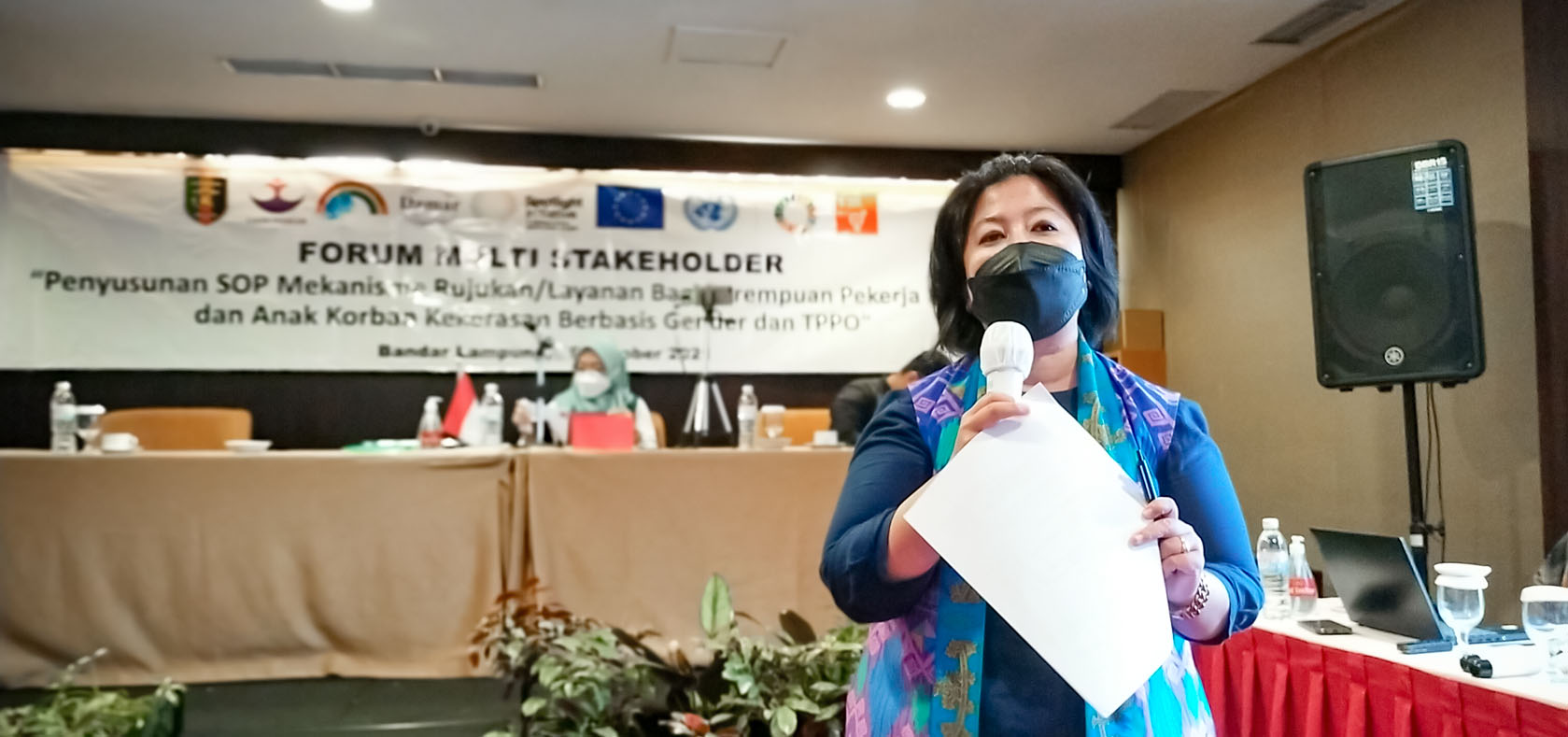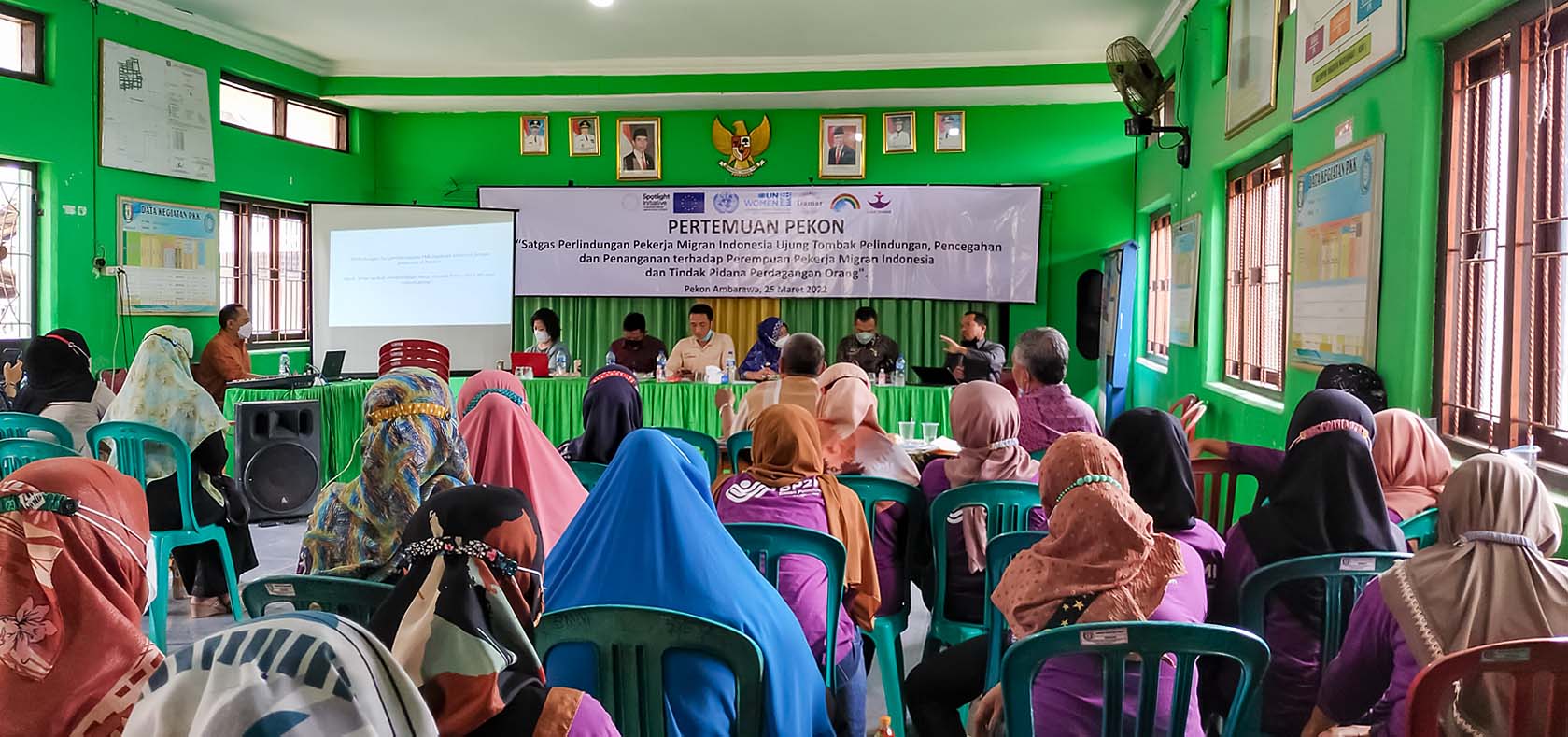Improving the coordination of GBV services to women migrant workers in Indonesia
Date:
Author: Yuni Asriyanti

" That night, I was with my two-month-old baby and had nowhere to go. I contacted the DAMAR hotline for help; they promptly responded to my call and referred me to the Protection House of the trauma centre of Lampung Province Social Service. I was immediately picked up and safely transported to the shelter. I recently discovered that their staff was in quarantine due to a COVID-19 infection when I contacted them. But that didn't hinder their service for my baby and me. I feel protected and not alone."
— Suli, a women migrant worker victim of domestic violence
Lampung, Indonesia — Suli is a women migrant domestic worker from Indonesia who struggled between domestic violence and working as a migrant domestic worker. Suli and her husband met and married when she was on leave in her hometown. After returning to Hong Kong, she found out she was pregnant and quit her job. Suli did not know that the Hong Kong Government allows pregnant migrant domestic workers to continue working. She feared her employer would be angry with her pregnancy, prompting her to return to her hometown.
The dream of a happy marriage and support from her husband turned into a nightmare. During her pregnancy, she experienced emotional and economic abuse from her husband. After giving birth to the baby, the husband abandoned her and the baby. For three months, Suli struggled independently, until a journalist heard her story and referred her to LAdA (Lembaga Advokasi Anak) DAMAR Women Crisis Center. Now, with assistance from DAMAR, Suli and her baby are in a safe place. However, they require various services, including health services, social protection, counselling, and legal assistance, that cannot be met by one service provider alone.
Suli’s case emphasizes the urgency of a referral mechanism between government-run and community-based service providers so that services for victims of violence, including women migrant workers, can be provided effectively.
"When the baby was sick, we admitted her to the hospital,” explained Anisa, who deals with case handling and database at LAdA DAMAR. “We contacted the local technical Implementation unit for the protection of women and children to provide healthcare services and pay for hospitalization. We also provided legal assistance to her as she decided to report her domestic violence case to the Regional Police. The essential services for Suli and her baby cannot be carried out by DAMAR alone."
In collaboration with the LAdA DAMAR, UN Women Safe and Fair Programme supports improving services for women migrant workers who are victims of gender-based violence and trafficking in the Lampung province. Efforts to strengthen the service are conducted by supporting the development of standard operating procedures (SOPs) for coordinated service and referral mechanisms for women and children victims of violence, including women migrant workers.
"The development of SOP of coordinated services and referral mechanisms is crucial,” said Waydinsyah, functional officer of the Indonesian Migrant Worker Protection Agency of Lampung Province. “So far, we have been providing services separately, especially when we deal with vulnerable groups, such as undocumented migrant workers who are deported and need health care. We are often confused about how to refer to the hospital because they do not have any legal documents, let alone Social Health Insurance."
Women migrant workers are vulnerable to gender-based violence at every stage of migration, interrelated with other violence, labour rights violations and economic abuses. However, gender-based violence experienced by women migrant workers often receives less attention and is hidden and forgotten at the bottom of the layers of labour violations.
According to the Indonesian Migrant Worker Protection Agency, 172,448 Lampung residents have worked abroad in the past five years. Of these, women make up the majority, working in the domestic sector. Many go through irregular channels, with human trafficking estimated to have doubled during the pandemic, while requestions for protection of witnesses or victims rose 15 percent.
"So far, the respective institutions have carried out the protection and services delivery for migrant workers, particularly women migrants,” said Waydinsyah. “Hopefully, the SOP that has been developed by the members of the Human Trafficking Task Force can be immediately approved by the Governor so that coordination for protection is easier."

Founded in 1999, LAdA DAMAR is a community-based service provider for women and children subjected to violence. It also advocates for the elimination of violence against women, including policy advocacy at the subnational level for the enhancement of services for victims of gender-based violence. During the pandemic, LAdA DAMAR has been expanding its services to women migrant workers through its hotline service and social media.
"In developing the SOP of coordinated services and referral mechanism, our strategy specifically involved human trafficking task forces of the Lampung Province,” said Selly Fitriani, executive director of LAdA DAMAR. “This programme supports and develops what is already owned by the subnational government, not starting from scratch."
The 2007 Comprehensive Anti-trafficking Law mandates the establishment of human trafficking task forces nationally and subnationally. Under the local technical implementation unit's leadership for protecting women and children, the SOP of coordinated service and referral mechanisms are developed collectively by members of the Human Trafficking Task Force. Several coordination meetings and joint consultations supported by UN Women have been held. The involvement of Task Force members in capacity-building activities and preparation of SOP has so far contributed to improving skill and capacity on gender sensitivity in service delivery, especially in applying a victim-centred and rights-based service approach. In addition, such serial activities become a shared space for members of the Task Force to meet and coordinate the services and responses to gender-based violence and trafficking cases in the Lampung Province. Currently, the SOP of coordinated services and referral mechanisms is in the process of legal harmonization in the Provincial Legal Department. It is ready to be brought to the next stage of the legalization process.